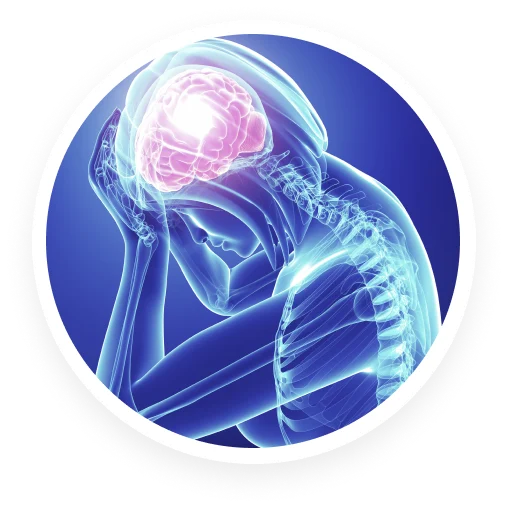
Migraines
According to the American Migraine Foundation, more than 37 million Americans suffer from migraines.
Allen Finney
Review
Young ladies behind the counter were nice and professional. Dr. Khan was and is awesome. You felt he really cared which I have not felt in the 2 years I've been injured. Only reason I did not give it 5 stars was the hard time I had finding it.
Allen Finney
Review
Young ladies behind the counter were nice and professional. Dr. Khan was and is awesome. You felt he really cared which I have not felt in the 2 years I've been injured. Only reason I did not give it 5 stars was the hard time I had finding it.
charles griffin
Review
Have been doing a wonderful job with help with my nerve pain, listen to me, and my request no to be put on pain killers but to help find the problem, always return calls so glad is was referred to them.
Stacey Mejia
Review
Awesome staff Dr. Kahn is a really good Doctor he listens and is a helping man!! I appreciate all of your guys work you do for your patients!! You even call to give reminder the day before your appointment! Again that's so awesome!!
Forrest Hammer
Review
NOTHING BUT THE BEST. ABLE TO WALK. ABLE TO PERFORM TASKS THAT I COULDN'T FOR A LONG TIME, LIKE DAILY WALKING, BENDING OVER, CARRYING GROCERIES AND ENJOYING A MOVIE AT THE CINEMA. THANK YOU DR. ASIM KAHN.
Jeanne Neathery
Review
Dr RYklin is amazing. He treats each patient as if you’re his only one. I’ve been seeing him for 7yrs due to a neck injury. He definitely finds what pain management meets your individual needs. The practitioners are amazing as well!!!!
Marty Klopper
Review
Pain Dr office. Staff is friendly and professional. Lots of paper work to be filled out. Office was clean and neat. Masks on Staff at all times and required for patients to enter. Will be going back for follow-up appointments.
Kim LindL
Review
The staff is very pleasant and Dr. Khan is very good with a needle I've been getting epidurals and shots in my foot and lower back for about 4 years now, he is very good and I would never go to another place
Angel Bussert
Review
The doctor actually listens. I have been a patient for years and love the staff and doctors. I've been to all the locations the country club one is always super busy queen creek location is never packed so I go there.
Guy Romero Jr
Review
Every Staff personnel are very professional, courteous and patient respectful in caring for each medical problem. We live out in Laveen, but finding good patient care are hard to find, Truly Blessed Guy E Romero
John Crosby
Review
They do a great job in today's challenging health care system. Great Nurse Practitioners who work hard. Great support staff. Doctors are expert practitioners. Stable practice. I have over five years personal experience with them.
Stacey Mejia
Review
Awesome staff Dr. Kahn is a really good Doctor he listens and is a helping man!! I appreciate all of your guys work you do for your patients!! You even call to give reminder the day before your appointment! Again that's so awesome!!
Kim LindL
Review
The staff is very pleasant and Dr. Khan is very good with a needle I've been getting epidurals and shots in my foot and lower back for about 4 years now, he is very good and I would never go to another place
Guy Romero Jr
Review
Every Staff personnel are very professional, courteous and patient respectful in caring for each medical problem. We live out in Laveen, but finding good patient care are hard to find, Truly Blessed Guy E Romero
Angel Bussert
Review
The doctor actually listens. I have been a patient for years and love the staff and doctors. I've been to all the locations the country club one is always super busy queen creek location is never packed so I go there.
Forrest Hammer
Review
NOTHING BUT THE BEST. ABLE TO WALK. ABLE TO PERFORM TASKS THAT I COULDN'T FOR A LONG TIME, LIKE DAILY WALKING, BENDING OVER, CARRYING GROCERIES AND ENJOYING A MOVIE AT THE CINEMA. THANK YOU DR. ASIM KAHN.
Jeanne Neathery
Review
Dr RYklin is amazing. He treats each patient as if you’re his only one. I’ve been seeing him for 7yrs due to a neck injury. He definitely finds what pain management meets your individual needs. The practitioners are amazing as well!!!!
Marty Klopper
Review
Pain Dr office. Staff is friendly and professional. Lots of paper work to be filled out. Office was clean and neat. Masks on Staff at all times and required for patients to enter. Will be going back for follow-up appointments.
John Crosby
Review
They do a great job in today's challenging health care system. Great Nurse Practitioners who work hard. Great support staff. Doctors are expert practitioners. Stable practice. I have over five years personal experience with them.
Carol Gravatt Davidson
Review
Absolutely the best place I have been too...so many doctors and always just prescribed pain pills for over 10 years. There is hope, after starting injections I feel so much better. I know I'm in the right place.
Tim Tuzon
Review
Been with Kahn for over a year and wouldn't want to be anywhere else. He is not a pharmacy! He solves the issues instead of hiding them with tons of drugs. Have had multiple procedures to correct the problems.
Brooke Keifer
Review
I was nervous when I brought my mom into the office. They are clearly a very busy office, but the front staff was kind, and the doctor was very confident in a treatment plan. Overall my Mom was very pleased with her visit.
Kari Lynn Plo
Review
I love Dr Ryklin and his assistant Liza! They've always been super good to me and very sympathetic to all my needs! They've done everything they can to make me comfortable and to help me with my pain! I'd refer anyone to them!
Lacey Smithson
Review
This office keeps getting better every time I go. Staff is friendly, doctors are very well educated and good at what they do. And they have helped decrease my mom's back pain by 80%! Everyone with pain should go to this place!
Katty Miller
Review
Dr. Khan is truly carrying, understanding and the VERY BEST AT ADMINISTRATING SGB INJECTIONS!!! I look forward to driving from California to be seen by him. I just can't say enough. Thank you Dr. Khan.
Britt Montoya
Review
Great place. Dr Khan is an awesome Dr and goes above and beyond to help you. Meghan is a wonderful P.A. as well. It says so much to have a Dr that truly cares about your outcome of your procedures. This is a goodhearted Dr
Julie Kierzek (Julz)
Review
Love them all. Dr Ryklin is so helpful and understanding. He takes helping people seriously & I'm extremely grateful for everything he & the PA's & MA's have done for me. Dr Ryklin has gone above & beyond for me.
Delicia N
Review
The team here are genuinely the most helpful providers I have ever had. I went through my worst lupus flare ever last year and mentally did not think I would make it. They truly saved me and made me feel like I could ask for help!
Caroline Copeland
Review
We are Dr. Ryklin's patients. He is an amazing pain management physician. All of the treatments that we receive work extraordinarily well. His entire staff, from front to back, are exceptional. Patient care is really the specialty here.
Eva Linda Hemmerling
Review
I'm a patient Dr. Khan/ NP Liza. I find Doc Liza caring always interested in me as a whole. Body/Mind/soul. Find comfort in her. Staff Dustin,Amanda are tops also. I highly recommend AZ Spine Institute. E.L.H.
Charles Eberhardt
Review
I have been to the Vineyard location 12 times and this is the best Doctor's office I have ever been to. The staff is by far the friendliest and most caring staff around. I actually look forward to my visits. Thanks for everything.
Becky Kirby
Review
For the last 12 years, Arizona pain and spine in Queen Creek with Lisa, has taken care of my pain issues. Without her, I wouldn't be able to manage the excruciating pain I have had after my time in the service
Brian Evans
Review
Dr Kahn is wonderful. He is a master of his craft. If it wasn’t for him, I’m not sure I would be able to function. He always listens, and really cares about his patients. I am so grateful for him and his staff.

What are migraines?
A migraine is known to cause throbbing pain that affects the head. Migraines can be moderate to severe, and for some, the pain comes and goes. Aside from migraine pain, other symptoms may be felt such as increased sensitivity to sound and light, vomiting, and nausea. It can occur in both men and women and usually starts during early adulthood.
Migraines are broadly categorized as episodic or chronic. Episodic migraines are those that occur less than 14 times per month. Migraines that occur for 15 days or more each month are considered chronic. Those who experience chronic migraines are more likely to feel that the condition lowers the overall quality of their life. These individuals tend to feel that the condition impairs them financially, relationally, and in other aspects of life.
What are the symptoms of migraines?
There are specific symptoms that occur before or during an attack. Some people also experience symptoms just before an attack occurs. A pins and needles sensation, vision phenomena, and uncontrollable movements are a few symptoms that may occur before a migraine. The most common signs before an attack are constipation, neck stiffness, mood changes, and increased thirst.
The most common symptoms are those felt during an attack. These include:
- Throbbing pain on one or both sides of the head
- Sensitivity to lights and sounds
- Pulsing pain
- Feeling lightheaded
- Blurred vision
- Nausea and vomiting
What causes migraines?
There is no exact cause of migraines. Experts say that they result from changes in the chemicals, blood vessels, and nerves in our brains. Genetics can also play a role. Although the cause of migraines may be unknown, there are several factors that can trigger them. They are as follows:
- Stress
- Lights
- Food and drink
- Fasting
- Exercise
- Hormonal changes
- Sleep changes
- Strong smells
- Weather
How are migraines treated?
There is not permanent cure for migraines. Symptoms may be alleviated through migraine remedies and treatments. Painkillers such as paracetamol and ibuprofen can lessen migraine pain or make it go away altogether. Triptans and antiemetics are also used to treat migraines. However, consult your doctor before beginning any new medications.
During an attack, sleep and rest can help alleviate migraine symptoms. Since some people become sensitive to light and sound during an attack, it helps to rest in a dark, quiet room until symptoms subside.
A study conducted reported in Headache Journal discussed the potential effectiveness that acupuncture treatment may offer for migraines. There were 22 studies conducted over an eight-week period that involved 5000 patients. Overall, roughly 50% of patients reported some reduction in the frequency of headaches.
AZ Pain and Spine Institute
Migraines Treatments
Here at Arizona Pain and Spine Institute, we improve our patients’ quality of life by alleviating and managing their pain. Some of our Migraines treatments include:

Why choose AZ Pain and Spine Institute to treat your Migraines?
We have a team of medical practitioners, pain management doctors, and staff who are experts on pain management, including Migraines. We use state-of-the-art technology and effective approaches in achieving our mission. We care about your well-being and are committed to making your life pain-free.
